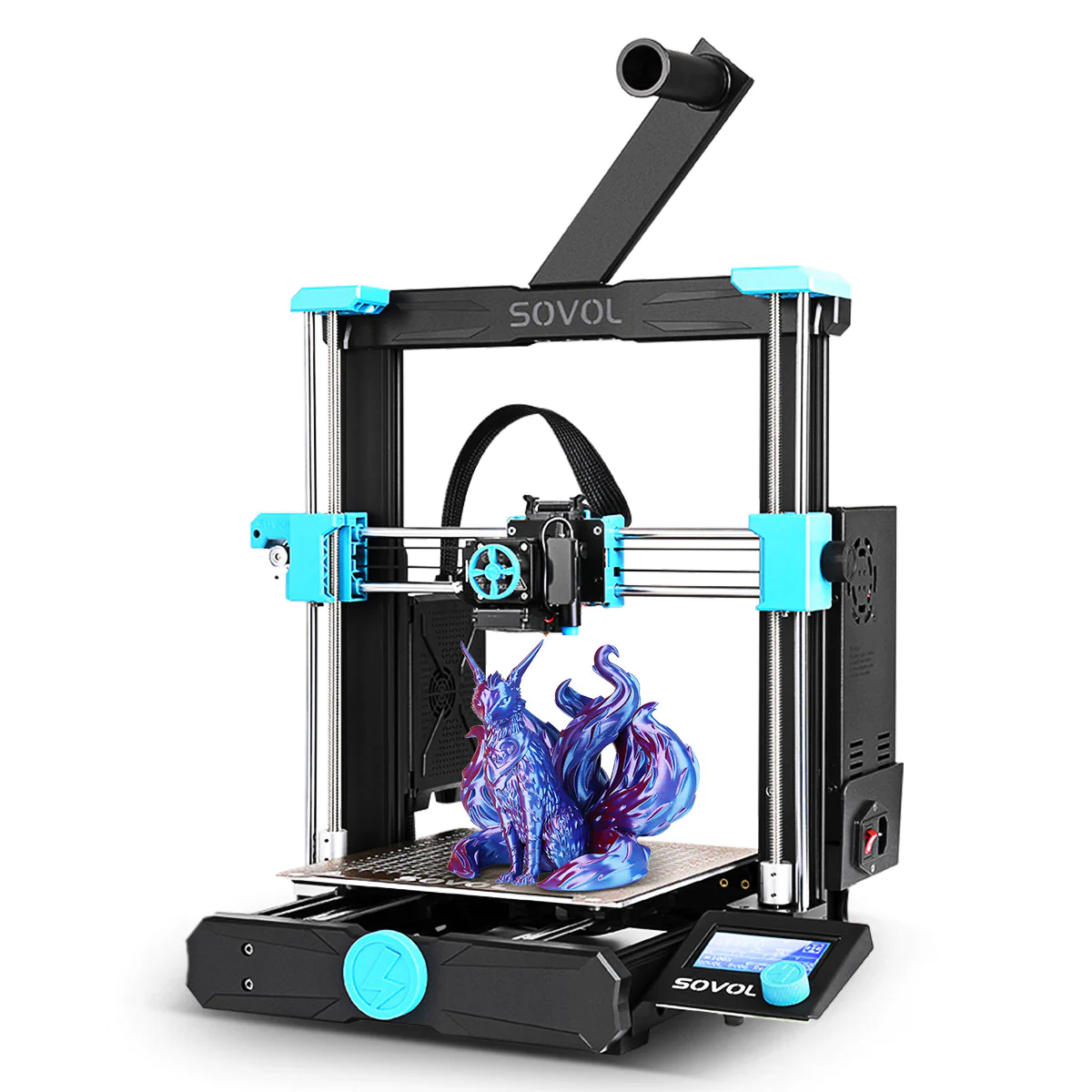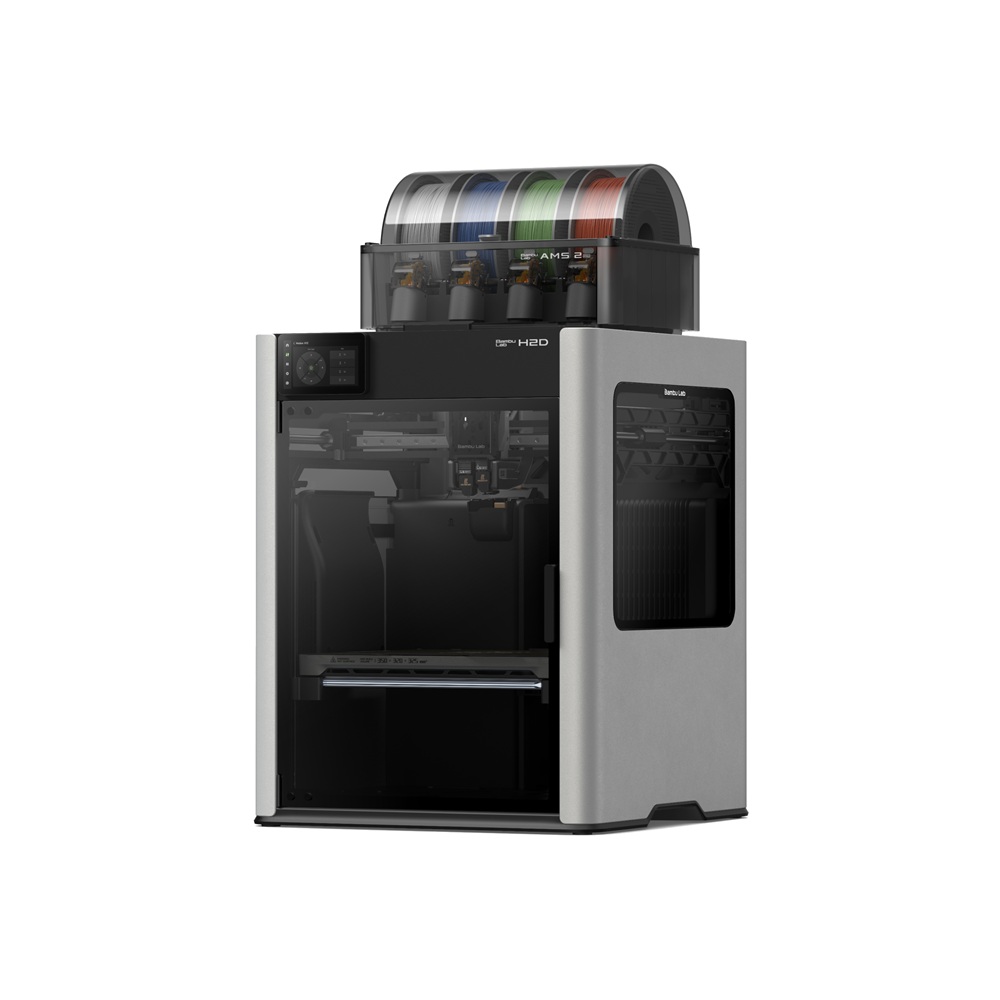Compare SV06 vs H2D
Comparison between the best 3D printers
Choose the best 3D printer at the best price. The cheapest 3D printers are here.
Buy a 3D printer here with 3D Fila.
 |
 |
|
| Model | SV06 |
H2D |
| Printing Material | Filament | Filament |
| Buy Filament for Sovol SV06 | Buy Filament forBambu Lab H2D | |
| Estimated price | $259,00 | $1899,00 |
| Manufacturer | Sovol | Bambu Lab |
| Release Year | 2022 | 2025 |
| Print Volume [mm] | 220x220x250 | 350x320x325 |
| Printer Size [mm] | 497x388x610 | 492x514x626 |
| Weight [kg] | 9 | 42,3 |
| Power Loss Recovery | YES | YES |
| Enclosed printer | NO | YES |
| Bed Leveling | Automatic | Automatic |
| Filament End Sensor | NO | YES |
| Bed type | Heated | Heated |
| Power supply system | Direct Drive | Direct Drive |
| Standard nozzle | 0,4 | 0,4 |
| Maximum Nozzle Temperature [°C] | 300 | 350 |
| Maximum Bed Temperature [°C] | 100 | 120 |
| Maximum printing speed [mm/s] | 80 | 600 |
| Filament holder | NO | YES |
| Camera for supervision | NO | NO |
| Recommended filaments | PLA, PETG, Tritan, Flex, ABS | PLA, PETG, ABS, ASA, TPU, PVA, Nylon (PA) |
| Recommended slicers | Cura, Simplify, Slic3r, IdeaMaker | Bambu Studio |
| Maximum Resolution [mm] | 0,1 | 0,01 |
| Processor | ||
| Display | Mono | Touchscreen 5'' |
| Power Supply | ||
| Connectivity | SD / USB | Wifi, Bambu bus, Cartão SD |
| Operating systems | Windows, Mac, Linux | Windows, Mac, Linux |
| Date of registration in the system | 2023-03-02 | 2025-03-31 |
| Release date | 2022 | 2025 |
| Extra features | The Sovol SV06 printer stands out for having a direct-drive extruder, providing better performance when printing a variety of materials. It has linear rods for greater precision and smoothness in movements, as well as an automatic bed leveling system, eliminating manual adjustments. Its all-metal hotend supports a wide range of materials. The SV06 also features sensorless homing and Z-axis self-alignment, increasing reliability and ease of use. Compatible with Klipper software, it offers the possibility of upgrades to increase printing speed. | Bambu Labs H2D combines high-speed 3D printing with a chamber heated up to 65 °C, dual extrusion with automatic nozzle switching, an AMS for filament drying and exchange, and AI sensors that detect failures. It offers optional laser and digital cutting capabilities, features intelligent calibration through computer vision, vibration control, enhanced fire safety, and real-time camera monitoring. |
| Support for multiple colors and materials (AMS and CFS) | NO | YES |
Notes * |
||
| Cost-benefit | 6 / 10 | 7 / 10 |
| Hardware | 0.6 / 10 | 7.2 / 10 |
| Tela | . | . |
| Print volume | 3 / 10 | 4 / 10 |
| Performance | 0 / 10 | 5 / 10 |
Conclusion |
| In comparing the Sovol SV06 and Bambu Lab H2D 3D printers, distinct differences highlight the strengths and suitability of each model for various user needs and budgets. The Sovol SV06 presents a cost-effective option for hobbyists and those new to 3D printing. Its features, such as an automatic bed leveling system and a direct-drive extruder, offer good performance for a variety of materials. However, while it provides basic functionalities and decent print quality, its limitations in printing volume and maximum speed may not meet the demands of more advanced users or larger projects. Conversely, the Bambu Lab H2D represents a premium solution, equipped with advanced features like a heated chamber, dual extrusion, AI sensor systems, and enhanced connectivity options. It excels in print speed and quality, making it more suitable for professionals and those engaged in complex or high-volume printing projects. Moreover, the H2D accommodates a wide range of materials, thereby expanding its versatility. From a cost-benefit perspective, the Sovol SV06 scores reasonably well for its price point, making it an attractive entry-level choice. The H2D, while more expensive, justifies its higher price with advanced capabilities and superior performance metrics. In conclusion, the choice between the Sovol SV06 and the Bambu Lab H2D heavily depends on the intended use and budget constraints. For casual users or beginners, the SV06 offers an accessible and effective introduction to 3D printing. In contrast, the H2D is ideal for professionals seeking cutting-edge technology, high print speeds, and versatility in material compatibility, despite its higher investment. |

